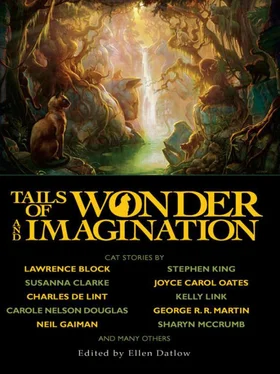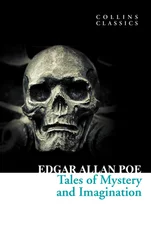Ellen Datlow - Tails of Wonder and Imagination
Здесь есть возможность читать онлайн «Ellen Datlow - Tails of Wonder and Imagination» весь текст электронной книги совершенно бесплатно (целиком полную версию без сокращений). В некоторых случаях можно слушать аудио, скачать через торрент в формате fb2 и присутствует краткое содержание. Год выпуска: 2010, ISBN: 2010, Издательство: Night Shade Books, Жанр: Фэнтези, Фантастика и фэнтези, Ужасы и Мистика, на английском языке. Описание произведения, (предисловие) а так же отзывы посетителей доступны на портале библиотеки ЛибКат.
- Название:Tails of Wonder and Imagination
- Автор:
- Издательство:Night Shade Books
- Жанр:
- Год:2010
- ISBN:978-1-59780-170-6
- Рейтинг книги:5 / 5. Голосов: 1
-
Избранное:Добавить в избранное
- Отзывы:
-
Ваша оценка:
- 100
- 1
- 2
- 3
- 4
- 5
Tails of Wonder and Imagination: краткое содержание, описание и аннотация
Предлагаем к чтению аннотацию, описание, краткое содержание или предисловие (зависит от того, что написал сам автор книги «Tails of Wonder and Imagination»). Если вы не нашли необходимую информацию о книге — напишите в комментариях, мы постараемся отыскать её.
collects the best of the last thirty years of science fiction and fantasy stories about cats from an all-star list of contributors.
Tails of Wonder and Imagination — читать онлайн бесплатно полную книгу (весь текст) целиком
Ниже представлен текст книги, разбитый по страницам. Система сохранения места последней прочитанной страницы, позволяет с удобством читать онлайн бесплатно книгу «Tails of Wonder and Imagination», без необходимости каждый раз заново искать на чём Вы остановились. Поставьте закладку, и сможете в любой момент перейти на страницу, на которой закончили чтение.
Интервал:
Закладка:
Benjamin and a chicken—that’s it. My healing career was over.
All attempts to locate Shannon failed. She left town that night apparently, and nobody ever heard from her. Nobody who would tell me, anyway.
A few years later, Dad died, and Mom died the year after that. I held out some hope that Shannon might show up at their funerals, but of course she didn’t. Aubrey died, unplugged by his parents apparently. I read the notice in the paper. I lurked nearby in the cemetery, but only the parents and the preacher were there.
When I came home after, even Ben finally admitted we were never seeing Shannon again. “I’m sorry,” he said. “I should never have surrendered to my predatory instincts.”
“It’s not your fault. You’re a predator, for christ’s sake. It was my fault. I had no business bringing that chicken back to life.”
He nodded in somber agreement. “True. True.”
We missed her terribly, but we rarely spoke of her. It was too painful for us both.
My parents had left me a modest inheritance, which I invested in the stock market. After weeks fine-tuning voice recognition software so Ben could use the computer, I turned the portfolio over to him, and in no time he’d made us wealthy enough to retire and travel. We went everywhere. If Ben had read about it, he wanted to go there, and if he wanted to go, we usually went, and if we went, I never regretted it. We went to incredible places. We went to ordinary places made incredible by the wonders Ben knew we’d find there.
I soon discovered that if you have enough money, you can take your cat anywhere, especially when you get older. People put up with things from old people, probably figuring they haven’t got too long. An old man denied his desires by some heartless gatekeeper may have missed his last chance. What sort of old age might such a heartless individual expect when it comes his time to travel about pathetically with some old cat in a carrier, when the sign clearly says no animals allowed? What? An empty building? Do you think homo sapiens aren’t animals? What then are they, I’d like to know! Oh yes, by the time I’m 84, I can take my cat anywhere.
Trouble is I’m too sick to go anymore.
We’ve come to rest in Catemaco, a lovely town on a beautiful lake in Mexico, that teems with cats and brujas —witches—and is a favorite town of ours. We’ve rented a place with a balcony overlooking the lake. The fishermen still fish with hand-tossed nets from small one-man boats. I like to watch them at dusk, casting their nets into water and sky the color of burnished copper. The fish are delicious, embedded with cloves of garlic and fried whole.
They’re only a memory to me now. I can’t keep anything down. Everything tastes like ashes anyway. The doctor has come and gone. He’s said there’s nothing to be done to save me. He could admit me to the hospital, so that I might be more comfortable, but when I said I would be more comfortable here watching the fishermen with my cat, he bowed, in deference to my age I suppose, and said he understood.
Benjamin, who’s befriended both cats and witches here, has returned with a woman named Hermalinda who brews teas for us both. He has broken his long silence with her, and she has agreed to come see to our needs. “Will it cure me?” I ask Ben of the tea she’s brewing. I’m surprised I can smell it. I haven’t smelled anything in a long while. I’ve had to give up cooking.
“Of old age,” Ben replies, but I’ve forgotten what I just asked him.
“I’m afraid,” I confess to my old friend.
“I know,” he says. “Everything will be all right. I’ll be joining you. Walk like an Egyptian.” He laughs at his cat humor, very sly, but I don’t get it. I wonder what Hermalinda is brewing for him. Probably nip. It’s always the nip with him.
Hermalinda props me up in bed so that I might look out the balcony at the copper waters, the fishermen’s nets like women’s fans opening and closing, leaving behind a glistening spray of memories. She holds the cup to my lips. It tastes of cloves and juniper. She patiently gives me the whole cup, sip by sip. The last sip is sweet, like honey, like roses.
She sets a saucer on the floor for Ben and quietly slips out the door. Ben quickly laps up his tea and jumps onto the bed, spry as ever, pushing my frail hands apart and inserting himself once more in my grasp. I can feel him through my skin, thin as paper, his heart beating, hard and steady, through my fingertips. “Good night, Jeffrey.” He purrs softly, and my hands tingle. I remember the tune from so long ago, centuries in cat years:
…Old Blue died and he died so hard
Shook the ground in my backyard
Dug his grave with a silver spade
Lowered him down with links of chain
Every link I did call his name
Here Blue, you good dog you
Here Blue, I’m a-coming there too!
Ben stops purring, and a moment later, his heart stops, and he’s gone just like that. He’s tricked me—knowing where he leads, I’ll follow—fleeing the unbearable emptiness of this world without him—he’s shown me the way. Some Day has finally come.
Everyone dies. Even Ben.
For me.
THE PUMA
Theodora Goss
Theodora Goss’s short stories and poems have appeared in a variety of magazines and anthologies. Many of them are included in her short story collection In the Forest of Forgetting and the poetry anthology Voices from Fairyland (2008). With Delia Sherman, she coedited the short story anthology Interfictions . She has won the World Fantasy and Rhysling Awards for her short fiction and poetry.
Goss says: “As I’m sure is obvious, I was inspired by The Island of Dr. Moreau , which I was reading at the time. But I’ve had an interest, for a while now, in characters who don’t get to speak. For example, the female monster who is destroyed in Frankenstein . She’s absolutely crucial to the plot, but she doesn’t get to say anything. The puma in The Island of Dr. Moreau is like that. She’s crucial to the plot (she is, after all, the one who kills Moreau), but she never gets to say anything or achieve full “humanity” in Moreau’s terms. She also happens to be the only important female character in the story, although in an early version there was actually a Mrs. Moreau, who was written out during the revision process. I’m particularly interested in these female characters who don’t get to speak, on whose silence the story in a sense depends. If they spoke, I think the story would be different… So I like to give them a voice, to give them their own stories and see what they would have to say for themselves. I’m sure that in an obscure way I was also influenced by my favorite cat story of all time, H.P. Lovecraft’s ‘The Cats of Ulthar,’ which is also a revenge story and a story about how powerful cats are. My cat, for example, adds her insightful criticism by chewing on the edges of my manuscripts…”
“Mr. Prendick, there’s a lady here to see you.”
I must have jumped, because I remember my knee banging into the desk. In the years since I had moved to this obscure corner of England, where even the trains did not come and I could walk over the hills for hours without seeing a human face, I had received only one visitor, the local vicar. There must have been something in my speech, perhaps even in my face, that agitated him, because he would not stay for dinner, and he left without urging me to attend services in the small stone church where he preached, in the valley below. I was sorry to see him leave. He had seemed like a reasonable man, although his inquisitive brown eyes and pinched face, a probable indication of early poverty, reminded me of a lemur. In all that time, I had never been threatened with a visit by anything that could remotely be described as a lady.
Читать дальшеИнтервал:
Закладка:
Похожие книги на «Tails of Wonder and Imagination»
Представляем Вашему вниманию похожие книги на «Tails of Wonder and Imagination» списком для выбора. Мы отобрали схожую по названию и смыслу литературу в надежде предоставить читателям больше вариантов отыскать новые, интересные, ещё непрочитанные произведения.
Обсуждение, отзывы о книге «Tails of Wonder and Imagination» и просто собственные мнения читателей. Оставьте ваши комментарии, напишите, что Вы думаете о произведении, его смысле или главных героях. Укажите что конкретно понравилось, а что нет, и почему Вы так считаете.












